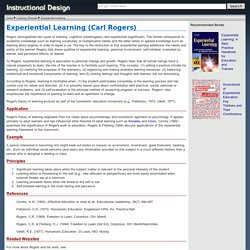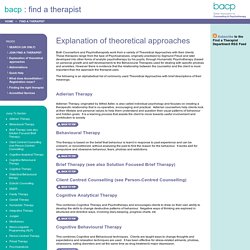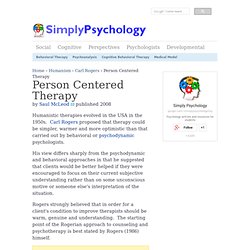

Carl Rogers. Rogers distinguished two types of learning: cognitive (meaningless) and experiential (significant).

The former corresponds to academic knowledge such as learning vocabulary or multiplication tables and the latter refers to applied knowledge such as learning about engines in order to repair a car. The key to the distinction is that experiential learning addresses the needs and wants of the learner. Rogers lists these qualities of experiential learning: personal involvement, self-initiated, evaluated by learner, and pervasive effects on learner. To Rogers, experiential learning is equivalent to personal change and growth.
Rogers feels that all human beings have a natural propensity to learn; the role of the teacher is to facilitate such learning. Roger's theory of learning evolved as part of the humanistic education movement (e.g., Patterson, 1973; Valett, 1977). Application Roger's theory of learning originates from his views about psychotherapy and humanistic approach to psychology. Person Centred. Short Description of Client-Centered Therapy. This is a short description of Client-Centered Therapy from my perspective as a student therapist, followed by links to local and remote resources on the subject. -- Matthew Ryan Client-Centered Therapy (CCT) was developed by Carl Rogers in the 40's and 50's.

It is a non-directive approach to therapy, "directive" meaning any therapist behavior that deliberately steers the client in some way. Directive behaviors include asking questions, offering treatments, and making interpretations and diagnoses. Virtually all forms of therapy practised in the US are directive. A non-directive approach is very appealing on the face of it to many clients, because they get to keep control over the content and pace of the therapy.
But what is in CCT, one may ask, if the therapist isn't interjecting their own stuff? The answer is, whatever the client brings to it. So, this is what CC therapists do: Listen and try to understand how things are from the client's point of view. Allan Turner's homepage. BACP Seeking a Therapist - Explanation of theoretical approaches.
Explanation of theoretical approaches Both Counsellors and Psychotherapists work from a variety of Theoretical Approaches with their clients.

These therapies range from the type of Psychoanalysis, originally practised by Sigmund Freud and later developed into other forms of analytic psychotherapy by his pupils, through Humanistic Psychotherapy (based on personal growth and self development) to the Behavioural Therapies used for dealing with specific phobias and anxieties. However there is evidence that the relationship between the counsellor and the client is more important than the approach the therapist uses. The following is an alphabetical list of commonly used Theoretical Approaches with brief descriptions of their meanings: Adlerian Therapy Adlerian Therapy, originated by Alfred Adler, is also called individual psychology and focuses on creating a therapeutic relationship that is co-operative, encouraging and practical.
Behavioural Therapy Cognitive Analytical Therapy Cognitive Therapy. Person Centred Therapy. By Saul McLeod published 2008 Humanistic therapies evolved in the USA in the 1950s.

Carl Rogers proposed that therapy could be simpler, warmer and more optimistic than that carried out by behavioral or psychodynamic psychologists. His view differs sharply from the psychodynamic and behavioral approaches in that he suggested that clients would be better helped if they were encouraged to focus on their current subjective understanding rather than on some unconscious motive or someone else's interpretation of the situation. Rogers strongly believed that in order for a client's condition to improve therapists should be warm, genuine and understanding. "It is that the individual has within himself or herself vast resources for self-understanding, for altering his or her self-concept, attitudes and self-directed behavior - and that these resources can be tapped if only a definable climate of facilitative psychological attitudes can be provided.
" Person Centered Approach Core Conditions Empathy.